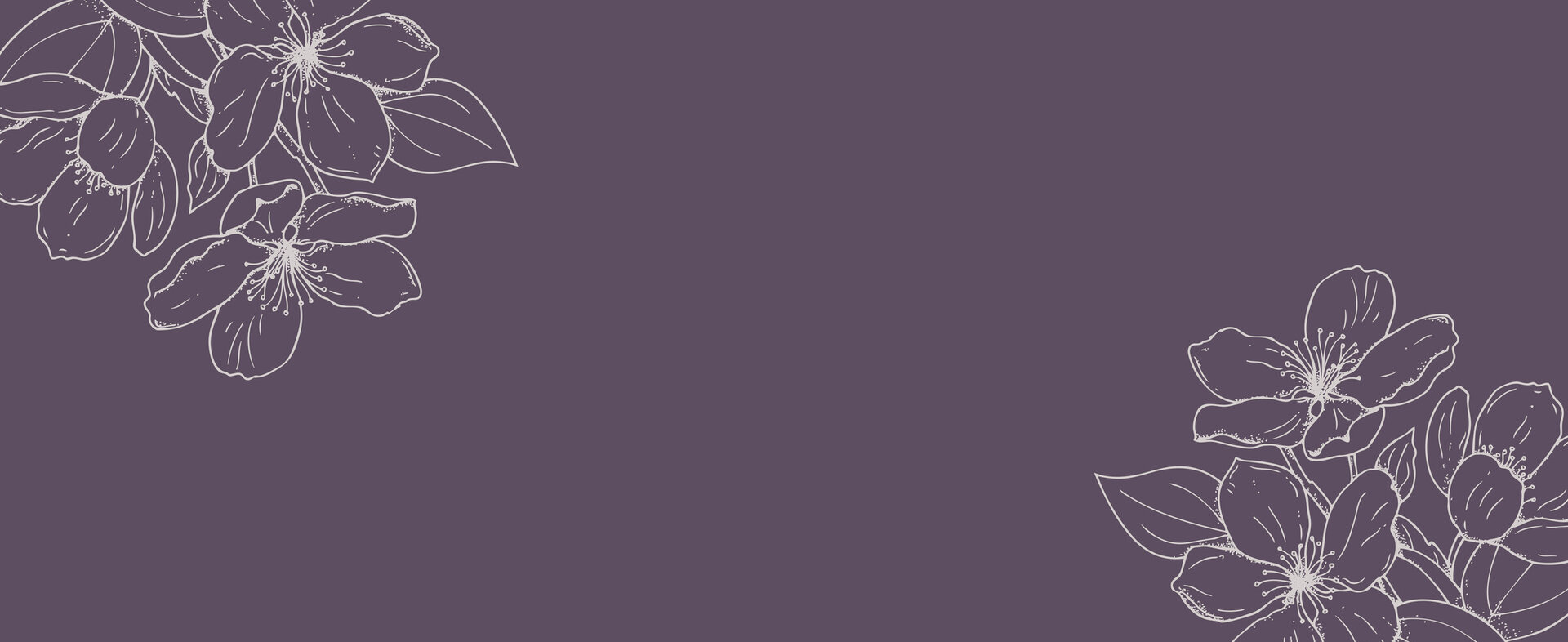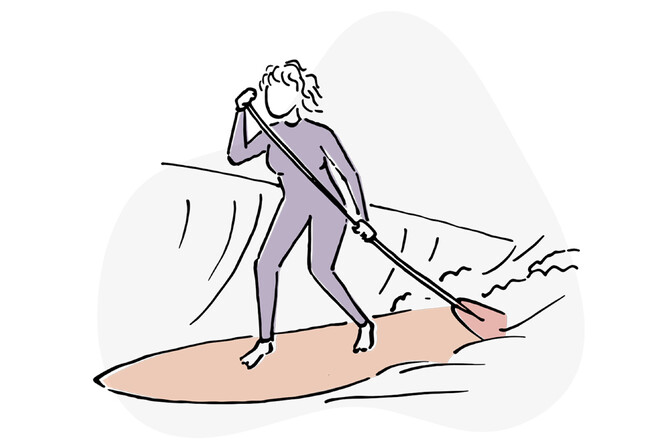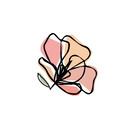POP at 54 / Story at 55
I love the outdoors. I’m a keen tramper. I enjoy stand up paddleboarding (SUP) and surfing, kiteboarding, sailing. I run bush skills courses for women. I can spend hours working in the garden. I feel fit and active.
POP!? Why me?
In July 2019, my peeing felt a little bit different for a couple of days. The following night I had to get up to the loo nearly every hour, each time feeling more uncomfortable ‘down there’. Explaining it to my husband the next morning, I said “it feels like something is going to fall out of my vagina”. No other way to describe it.
After googling my symptoms, ‘bladder prolapse’ appeared on the screen. It sounded vaguely familiar, but I certainly couldn’t relate it to me. Luckily I managed to get the last appointment at the medical centre (it was Friday of all days!). The doctor’s examination confirmed a prolapse – not bladder but uterus. I felt stunned.
In a matter-of-fact yet assertive way she gave me clear directions on what to do next – appointments with a pelvic physio and a gynecologist. The words that impacted on me most though, were “there is no reverse of a prolapse”.
Back home I googled again, uterus prolapse. The websites were predominantly from the United States, UK and Australia. All confirmed ‘there was no reverse’.
How could this happen? I hardly ticked any of the listed risk factors. Yes, I had given birth twice, but both were easy births. I was 54, but not even in menopause. I am active, fit, have a good diet, am not stressed – so why me?
Trying to process it, I spent the rest of the day lying on the sofa with my legs up the wall. Wishful thinking, but I must have been in a daze as I actually went to work the next day. How absolutely ridiculous in hindsight! I was teaching workplace first aid and knew it would be a full class. Having taught the same topics for fourteen years, the words flowed on their own while I wondered if I’d stay in one piece till the end!
I’ve never spent as much time on the computer as I did that weekend. Amongst the meagre information I found, this snippet stood out and helped me cope through the first days:
“The experience made me realise we are all out of control in some way. It is how we handle being out of control that is important.”
I still felt completely lost though. I was desperately hoping that the diagnosis might be wrong, or at least less dire. This was not the case, but my appointment with the pelvic physio, Mary Scullion, was the first real positive step on my new journey. She listened, answered my many questions, examined, explained and gave me guidelines. Above all, she was empathetic and supportive. Her parting words were: “Relax, it won’t just fall out!”. Gulp – good to know!
My next appointment was with a gynecologist. In a matter-of-fact way she outlined the three main reasons that would have contributed to my prolapse: having given birth, age and genetics.
So this was it. I had a uterus prolapse. It wasn’t too bad, no operation required, but it would never be the same again – ‘Never be the same again!’ It was all about management. Pelvic floor exercises. No heavy lifting. Not overdoing things. Welcome to a life with POP!
I researched a lot. I read that pelvic organ prolapse affects approximately 50 percent of women and 30 percent of female athletes, some of whom hadn’t even given birth.
It’s not a subject people talk about. So I started talking about it. I told all my female friends. I found out that two of them had had a prolapse as well. I thought if POP affects so many of us, there must be lots of other active women out there in the same situation as me.
This whole new situation was affecting me hugely, both physically and mentally. I hadn’t been tramping or out on the water for several months now, not to mention having a very unrelaxed sex life. Plus, my head was bursting with questions. Why me? How do I cope when I can’t be as active? What can I do and what shouldn’t I do? How do I manage this ‘for the rest of my life’?
I was crying out for help. I longed to hear about the experience of others affected by POP – how they manage the restrictions to their sporting activities and the complications of home, family, work. There was frustratingly little information out there. I came across the Hypopressive Technique. It sounded like an interesting and different type of exercise to strengthen the pelvic floor muscles, however no one was instructing it in New Zealand.
With regular pelvic floor exercises my uterus eventually started feeling a bit more stable. Swimming and walking felt the most POP-agreeable forms of exercise for me. I progressed to the first day tramp, then an overnighter (“hey girls, can you carry a bit of extra gear for me?”). I went stand up paddleboarding – flat water, then surf. That was good for my head, to say the least.
Over the summer we were out a lot. I climbed Mt Taranaki, did a couple of multi-day tramps, started kiteboarding again (“can someone pump up my kite so I don’t pop my uterus?!”). However, all this renewed activity was a bit too much. My prolapse made itself felt again. A reminder of reality and an overwhelming feeling of despair.
Mary Scullion had moved to another city, so back to Google. I found a great website from a pelvic physio in Australia, Michelle Kenway. She gives clear and helpful explanations, has informative video clips and a good book on safe exercises with pelvic organ prolapse. She gave me hope that exercise wasn’t over for me yet!
Another website that caught my attention was from a pelvic physio in America. I contacted her, and Buffy Stinchfield became my angel in my most despairing moments. Her empathy, support and encouragement helped me through a very low time. She suggested a pessary to enable me to carry on with my activities and emphasised the importance of staying active – to keep my sanity!
My new pelvic physio, Claire Baker, is now helping me on this journey. She worked with me to find the right pessary that I can insert/remove myself for extra support and confidence when I need it. Claire is wonderful, and has helped me regain physical stability. I have huge admiration for her and for pelvic physios in general. They radiate empathy, energy, support and a real passion for their work.
I consider myself lucky that I am able to pay for the physio and gynecologist visits. The hospital had turned down the doctor’s referral within a week. According to the gynecologist, ACC generally doesn’t accept prolapses, whether they are triggered by a sporting activity (as possibly in my case) or not. I developed a deep compassion for other women who have to go through this and have to endure the pressure in their vagina while waiting for the hospital to reconsider their case.
I decided to resign from my job and make do with less. The prolapse wasn’t the main reason, but standing in front of a class for 8–9 hours straight certainly didn’t help.
Life is different when you have to cope with POP. You avoid constipation by all means. You make humming and oooing sounds when you poo; practice different positions for poos and pees. Sex is not quite the same. You prefer not to run or jump down the steps as you did before.
You tramp carrying as little as possible. You focus on breathing out on your SUP paddlestrokes (tricky when you paddle fast to catch a wave!). You might have to change your job. You learn to listen to your body even more than you might have done before.
To find answers to my overiding question, “How do other active women deal with pelvic organ prolapse?”, I decided to compile a book of stories (which turned into a website instead). It is still early days for me on this journey. But if so many women are affected by POP and it is so under the radar, then they must surely experience similar emotions and have similar questions.
Do they feel lost, alone, scared, frustrated? Did they lose confidence in the usual strength of their body? How do they manage the restrictions to their sporting activities? What physical, and especially mental, effects does this have?
I sincerely hope that these shared experiences will help all of us to feel less alone. Thank you all for your contributions – the incredibly beautiful power of energy between women supporting women!



